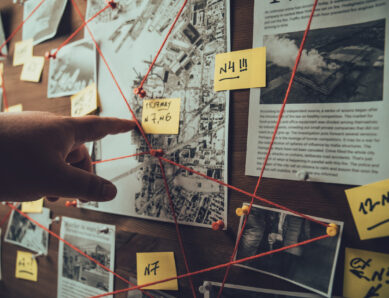It was certainly an unusual way to start a Wednesday morning.
Four members of the Mind Tools Content team stepped into an office at the National Museum of Egyptology. Moments later, they discovered that they were locked in.
They had an hour to work out who’d trapped them, and how to get out. If they didn’t, a priceless artefact would disappear for ever – and the museum’s reputation with it.
There was a pile of documents on the desk in front of them. On top of the pile was a letter, addressed to them. And the clock was ticking…
Secrets of the Escape Room
Pause the countdown for a moment. Let me explain how my colleagues had ended up in this strange situation.
I’m a writer here at Mind Tools, and I’d recently finished an article on escape rooms: collaborative, puzzle-solving challenges that are becoming increasingly popular with workplace teams. To accompany the article, I’d decided to create a downloadable kit, to give people everywhere a taste of this exciting new approach to team building.
What’s more, amid the COVID-19 pandemic, I’d seen this as an opportunity to let people practice working with others remotely. And, if they could have some fun in the process, all the better.
So I came up with “The Lost Labyrinth,” a themed escape game designed to work either face-to-face or with players connected online. I needed a team prepared to take a step into the unknown to test it out – and, thankfully, I didn’t have far to look.
The Escape Room Team
Matt: A Mind Tools Content Editor, and a successful escapee from several physical escape rooms. Trusted to use his logical thinking and leadership skills to captain the team.
Kevin: Another experienced Content Editor, but a novice at escape rooms. Always ready for a challenge, however, and known to have excellent calculation and risk-management skills.
Rosie: An Assistant Writer/Editor, with one escape room success already under her belt. Renowned for a sharp eye for detail and high level of creative flair.
Alice: Our Content Team Assistant. An escape room newbie, but a confident team player and an expert problem solver.
And me: writer by day, puzzle fan and escape game enthusiast by night… now eager to gauge the success of my kit – and my colleagues!
Ready for Lockdown
So there they were that Wednesday morning: four team members sitting in front of laptops in their own homes – but also, by the magic of technology and imagination, at a table in a darkened museum, with a devilish plan to foil.
59 Minutes Left
The game was on. From my position in the shadows (or at least with my camera turned off!), I watched events unfold.
Rosie: Admittedly, my expectations of a virtual escape room were pretty low. I’d done one real-life escape room in the past, and thoroughly enjoyed it. However, I doubted that an online version could be anywhere near as convincing as the real thing. How wrong I was.
Matt: We all joined the team call raring to go. But we quickly realized that this wasn’t going to be a walk in the park.
Alice: I was a bit anxious that I’d struggle with the puzzles – especially since I’d only just woken up – and didn’t want to slow the group down. But I was up for a challenge, and intrigued by the Egyptian-themed “whodunnit” narrative. So I channelled my inner Sherlock, and threw myself into solving the case of “The Lost Labyrinth.”
Kevin: Only afterward did I discover that some people had tackled an escape room before. No wonder they were so good! Anyway, that’s my excuse, and I’m sticking to it…
48 Minutes Left
The players were now in no doubt about the perilous position they were in, and the level of teamwork they’d need to get out of it!
Rosie: As soon as we started, I was struck by how absorbed I was. At times I truly believed I was stuck in our tiny spare room! Perhaps my confinement at home for the last couple of weeks had given me an overactive imagination!
Matt: The opening puzzle left us completely stumped for a good few minutes – you could almost hear our brains creaking into gear. But, as we progressed, stumbling blocks became manageable, connections were easier to make, and we tuned in to each other’s ways of thinking.
Alice: I think that this game is great for teams who are struggling to communicate, or those that need practice collaborating on projects. I could almost feel our team being energized and sharpened as we pushed on through the puzzles. Each person brought a different skill or attribute, and I was glad that we were all in it together!
Kevin: Solving fiendish clues with the aid of a hieroglyphic code breaker, applying logic, understanding the mind of our captor, finding ways to unravel seemingly incomprehensible pointers… I was never going to do it on my own. But as a team – well, that was a very different matter. Through brainstorming, batting ideas back and forth, and by making some bold group decisions, we were on track to save the day.
37 Minutes Left
By now, several important parts of the mystery had been solved – but, each time, a fresh puzzle presented itself.
Matt: Somewhat naively, I hadn’t expected the escape room to be quite so challenging. But, as Jonathan commented later, if it isn’t hard then there’s really no point. I also hadn’t expected the variety of skills that would be required. It quickly became apparent that problem solving, communication, collaboration, and creativity were all essential.
Rosie: I had to remind myself that this was a team-building exercise, and that I needed to lower my voice and let other people get involved. I have a habit of taking over in group activities, so this certainly helped to highlight that and encourage me to step back from time to time.
Matt: I was in charge of the “decoder” that was needed for some of the puzzles. Code breaking is not one of my strong suits, nor is handling frustrated teammates losing patience with me… However, I got the hang of it eventually. Just about.
Alice: We were all caught up in the adventure. My big tip to other teams would be to listen properly to the Game Master’s instructions and hints, as well as to your teammates’ ideas. You’ll miss vital clues and connections if you don’t. Be patient, too. There are times where you’ll need to try several different approaches before you get unstuck.
13 Minutes Left
By this point, the team had developed some creative ways for communicating remotely, including holding up important clues to the camera.
Alice: If you’re doing this virtually, I think having a good video call app is key. It helps if everyone can see and hear each other clearly, and knows how to get in on the action.
Matt: The challenge was intensified by collaborating remotely, but we made the most of it, enjoying the chance to be immersed in the game and forced to work and think as one.
Alice: When you’re in the same physical space as a team, you can point to things and see what the other players are looking at. But working together through a screen means you have to be thorough and detailed when you’re communicating your thinking.
Four Minutes Left
The time was nearly up, and the players were now tantalizingly close to escaping. A few hints from the Game Master nudged them even closer, and suddenly everyone was firing off ideas.
Matt: I was most impressed with all our random, excitable outbursts of correct answers at various moments – when the stars aligned, and the answers to complex cryptic clues suddenly became clear as day.
Kevin: One person’s breakthrough led to eureka moments for the rest of the team. So, in the end, step-by-step, breakthrough-by-breakthrough, we found our way out. Together.
Teamwork in the Escape Room
It was fascinating to watch how my four co-workers tackled the challenges I’d set. They willingly pushed their collaboration, communication, and creative thinking skills to the limit as the minutes flew by, working with energy and enthusiasm.
They all brought different things to the task – like Kevin, working quietly in the background and then suddenly remembering a clue he’d spotted earlier, or Alice meticulously deciphering the hieroglyphs. Rosie had flashes of creative brilliance as she saw connections that no one else had spotted. Matt was determined to master that devilish decoder!
And, crucially, they all supported each other, praising breakthroughs, encouraging everyone to keep going – and not showing too much frustration when others didn’t quite get things right!
Working in the Dark
Escape rooms challenge you to cope when you don’t know what to do next, and the Mind Tools team showed admirable strength of mind and character when those moments arose. I loved watching and listening to the to-and-fro of ideas – usually ending up with a burst of excitement when their joint ideas formed into a way forward.
In these games, as in life, it’s important to know when to ask for help. As Game Master, I was ready with hints and clues when required. But mostly it was the team’s collaborative energy, flexible thinking skills, and never-say-die attitude that got them out of the locked room with the information they needed – and just seconds to spare.
30 Seconds Left: Free at Last!
The door was unlocked, the treasure was safe, and the criminal plan was in tatters. Despite having to communicate at a distance, the team had worked together to achieve something very satisfying – against all the odds.
Alice: Wow, that was so much fun! What a great way to test and develop a huge range of skills, while strengthening our team’s relationship at the same time. I loved the satisfaction of correctly solving each puzzle as a group. I now have an even stronger respect for my quick-thinking teammates.
Rosie: Once we’d successfully “escaped” and identified the culprits, it’s safe to say that I was excited and exhausted in equal measure! It was great fun – not only getting to speak to my teammates outside of a formal meeting, but also simply working together again. It felt like the good old days.
Your Turn in the Escape Room
So the Mind Tools team beat “The Lost Labyrinth.” I wonder if yours would, too. Locked in a room, with a complex new problem to solve, would your people rise to the challenge? There’s only one way to find out…
To learn more about using puzzle-solving games to test and strengthen your team, read our new article on Escape Rooms. Mind Tools Club and Connect members can then download and play “The Lost Labyrinth” for themselves.
And when you’ve done that, we’d love to hear what happened! Please tell us about your team’s adventure, in the Comments section, below.





Comments
Rafael Cortes says
3 years agoThis seems very interesting to apply to any teams inside the organization. Is there any chance to help you translate this game to Spanish? It will be great! Maybe you have this in mind.
Regards from León, México.